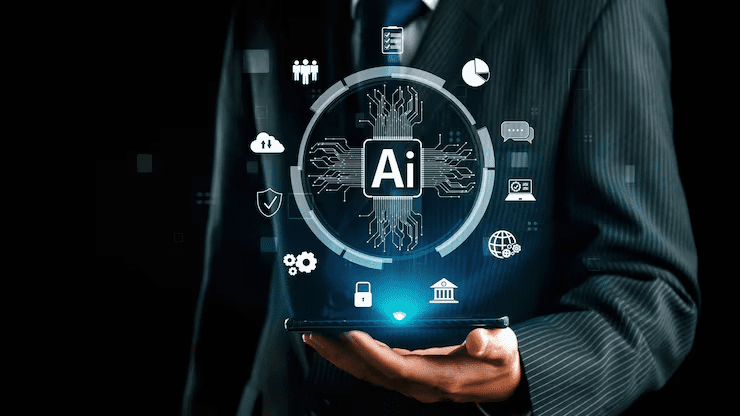SEO is evolving faster than ever — and artificial intelligence is quietly leading the revolution.
When Search Engines Started Thinking
There was a time when SEO felt mechanical.
You picked a keyword, wrote a 1,200-word article around it, built a few backlinks, and voilà — you ranked.
That formula is dead.
Today, search engines don’t just index; they interpret. Algorithms powered by machine learning, natural language processing (NLP), and neural networks don’t simply read words — they understand intent.
And if that wasn’t enough, the rise of AI search assistants (ChatGPT, Google’s Gemini, Perplexity, Bing Copilot) completely flipped how people interact with information.
Users no longer browse endless result pages. They ask. And AI answers.
That’s a tectonic shift. Because now your brand isn’t competing for a blue link — it’s competing to be the source that AI trusts enough to quote.
This new battlefield is called AI SEO, and it’s transforming how modern agencies — especially data-driven ones like ICODA — help projects stand out online.
What Exactly Is AI SEO?
Let’s clear the noise.
“AI SEO” doesn’t mean “using ChatGPT to write blog posts.” That’s the surface level.
The deeper layer — the real one — is about teaching artificial intelligence to understand, trust, and reuse your content.
Here’s what that actually involves:
- Semantic Optimization — structuring content so AI recognizes entities, relationships, and context (not just keywords).
- Predictive Analytics — using AI tools to forecast ranking changes before they happen.
- Automated Technical SEO — machine-driven fixes for meta tags, schema markup, site speed, and internal linking.
- Generative Search Readiness — preparing your content for use inside AI summaries and chat-based search answers.
- LLM Visibility Tracking — monitoring where your brand appears inside AI-generated responses across platforms.
It’s not about gaming algorithms anymore — it’s about collaborating with them. At this stage, many businesses struggle to implement these AI-driven strategies correctly. It might be better to seek professional help from agencies or industry experts who offer AI visibility services to make sure it’s tackled correctly.
Why AI SEO Matters Most in Crypto and Web3
Crypto isn’t like any other industry.
Audiences are skeptical. Information changes daily. Regulations shift monthly.
And the competition? Ruthless.
Projects need visibility fast — but they also need trust. That combination is nearly impossible without a deep technical and semantic understanding of how people (and machines) discover content.
That’s where AI SEO becomes the secret weapon.
Because AI doesn’t just rank your content — it decides whether your information appears in voice answers, chat responses, or even smart assistant summaries.
If your content structure is wrong, or if your data isn’t formatted correctly, you’ll vanish from these intelligent search layers.
That’s why agencies with crypto expertise, like ICODA, are integrating AI SEO into every marketing service.
They don’t just build backlinks; they build machine comprehension.
How AI SEO Actually Works (A Practical Breakdown)
Let’s unpack it step by step — the way modern digital agencies run it today.
1. Data Collection and Baseline Audit
First comes the audit: crawl data, keyword history, page speed, indexing, ranking anomalies, LLM visibility (if any).
Modern tools like Frase, SurferSEO, or SearchAtlas analyze not just where you rank, but why.
This helps create a machine-readable map of your site — like a neural fingerprint that AI systems can later parse.
2. Semantic Structuring
Gone are the days of “keyword stuffing.”
AI SEO means building meaning networks — clusters of related entities, synonyms, and user intents that paint a full picture.
You might target “crypto wallet,” but also include linked concepts like “private key,” “DeFi,” “cold storage,” and “security layers.”
When AI crawlers detect these semantic patterns, your site gets classified as an authoritative source, not just another keyword farm.
3. Generative Search Optimization
This is the fun part — optimizing not for the Google results page, but for the AI summary.
AI SEO ensures your page is:
- Answer-formatted (concise paragraphs, bullet lists, short sentences).
- Factually verifiable (linked sources, citations, transparent data).
- Schema-tagged (so models can extract information cleanly).
That’s how you land in generative overviews — those new AI answers above search results.
4. Predictive Ranking & Algorithm Simulation
Artificial intelligence can simulate Google’s ranking behavior.
By feeding content through models trained on algorithmic updates, agencies can predict which pages are at risk before rankings crash.
Imagine being warned two weeks before your traffic dips — that’s predictive SEO.
5. Technical Automation
AI tools like AlliAI or Screpy now auto-correct metadata, compress media, fix schema errors, and even re-optimize headlines in real time.
It’s like having an SEO engineer that never sleeps.
6. Continuous Reinforcement
AI SEO isn’t static.
Agencies constantly feed new data — CTRs, user behavior, query intent shifts — into learning systems to keep optimization alive.
It’s a feedback loop: the more data, the smarter the strategy.
How ICODA Built AI Into Its SEO DNA
ICODA started as a performance-driven crypto marketing agency, helping blockchain startups, DeFi apps, and token projects grow visibility worldwide.
But they quickly realized something — SEO in this field was evolving faster than human teams could keep up with.
So they turned to AI.
Today, their SEO workflows mix machine-learning analytics with human creativity:
- AI keyword clustering that maps related topics across multiple languages.
- Predictive dashboards showing where rankings may fluctuate next.
- Multilingual optimization (English, German, Russian, Korean, Japanese) built on AI-based translation and context models.
- Content refinement algorithms that score tone, engagement, and factual accuracy.
- Automated link profiling using AI-based toxicity and authority scoring.
What makes their approach powerful is balance — technology + storytelling.
AI handles structure, speed, and analysis. Humans handle nuance, tone, and authenticity.
That’s the formula for SEO that lasts longer than one algorithm update.
You can explore their full approach on https://icoda.io/, where even the site architecture reflects their philosophy: semantically layered, multilingual, and built for both users and AI crawlers.
The Role of AI in Content Creation (and Why It’s Not Replacing Writers)
AI doesn’t kill creativity. It magnifies it — when used right.
Instead of replacing writers, AI helps them:
- Identify trending questions before they peak.
- Analyze competitor tone and structure.
- Suggest entity relationships that boost relevance.
- Generate data-driven outlines for high-intent topics.
But the voice, the emotion, the story — that’s still human territory.
ICODA’s SEO editors take AI insights as a starting point, not a finish line.
They use machine data to guide angles, then inject personality and brand tone manually.
Because Google — and users — can smell robotic writing a mile away.
The Hidden Metric: LLM Visibility
Here’s something most brands still ignore: LLM visibility — how often your content appears in AI chat answers.
This metric will soon be as important as “organic impressions.”
If your project never shows up when someone asks ChatGPT or Bing “What’s the best DeFi platform?”, then no matter how well you rank on Google, you’re losing the real discovery war.
AI SEO tracks that visibility, identifies missing contexts, and re-optimizes your content so you start appearing inside generative answers.
That’s where early adopters, like ICODA’s clients, are already winning.
Challenges of AI SEO (and How Smart Agencies Handle Them)
Every revolution has growing pains.
AI SEO is no different.
- Over-automation.
When everything is generated by machines, tone and originality die.
ICODA keeps a “human override” rule — nothing goes live without manual edit. - Data hallucination.
AI sometimes invents facts. Strict editorial review is non-negotiable. - Algorithm instability.
Generative search results are volatile — models evolve monthly. The only solution: continuous monitoring and retraining. - Ethical transparency.
Disclosing AI-generated content is increasingly required. Agencies must balance efficiency with authenticity. - Multilingual nuance.
AI translation tools often miss cultural tone. ICODA solves this through hybrid human review + AI localization.
The agencies that can handle these challenges will dominate the next SEO cycle.
Why Human-AI Collaboration Wins
Here’s the truth: neither humans nor AI can win this game alone.
Humans bring emotion, storytelling, empathy.
AI brings scale, precision, and predictive intelligence.
Together, they make marketing smarter — not colder.
That’s what ICODA embodies:
a place where algorithms and artists work side by side, shaping campaigns that both rank and resonate.
The Future: Search Without Searching
Picture this: two years from now, you ask your phone, “Which wallet should I use for daily transfers?”
You don’t see a list of links.
You hear one answer — spoken by your AI assistant, sourced from a handful of verified websites.
If your project isn’t in that verified dataset, it doesn’t exist in the future of search.
That’s what AI SEO prepares you for — the world where being “indexed” isn’t enough. You must be understood and trusted by intelligent systems.
And agencies like ICODA are already building that bridge — between human stories and machine comprehension.
Final Thoughts: Adapt or Vanish
The future of SEO isn’t about tricking algorithms.
It’s about collaborating with them.
Those who still rely on keyword stuffing and outdated backlink schemes will disappear with the next update.
Those who understand AI SEO — the structure, the semantics, the machine logic — will own the web’s next decade.
So, if you’re building something worth finding — a blockchain startup, a tech platform, or a new digital product — don’t settle for old-school tactics.
Work with teams who treat AI not as a threat, but as a creative partner.
Work with people who build visibility not just for Google, but for the intelligent systems that will define how humans discover information.
Because the future of search is already here — it just looks a lot more like conversation than a query box.



































